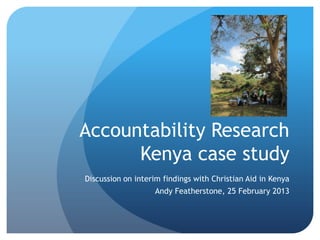
Accountability impact research - results from the kenya pilot study
- 1. Accountability Research Kenya case study Discussion on interim findings with Christian Aid in Kenya Andy Featherstone, 25 February 2013
- 2. Itinerary Day Activity Sunday Contextualising methodology induction with translator Monday Meeting with UCCS Trial exercise with community – Kyawango location Tuesday Meeting with Prog Mgt. Com. – Itoleka location Meeting with mixed group Wednesday Meeting with PMC – Mutulu location Meeting with mixed group Thursday Meeting with PMC – Kalawani location Meeting with mixed group Friday Meeting with PMC – Kithungu location Meeting with mixed group Saturday Meeting with 4 groups – Ukanga location Return to Nairobi
- 3. Context and partner profile • Makueni County in Eastern Kenya • Communities practice small scale rain fed agriculture • Unreliable and erratic rainfall associated with water scarcity has led to increased frequency of droughts • UCCS is CA‟s main partner in the East and has been operating in Kitui Machakos and Garissa since 1987 • Action plans developed out of the PVCA process led to the prioritisaiton of a project partnering the community to construct sand dams that will not only serve the livestock and crops but also help in shortening the distance that people take to access water for domestic use, particularly women.
- 4. The approach A methodology was developed which mixed quantitative and qualitative approaches and was used fairly consistently throughout the research Scorecards and opinion ranking exercises were used to describe accountability mechanisms and as entry points to wider discussions about their contribution to project quality All of the exercises were translated into Kikamba and the discussions were facilitated by a translator Each community meeting lasted between 2.5 – 3.5 hours
- 5. Participation Total male participants = 63 Total female participants = 87 Discussions were held in mixed groups of 10- 15 people. Typically a meeting was held with the Management Committee in the morning and with a selection of youth, female or mixed groups in the afternoon. Participation was disaggregated by gender (although the results of the exercises were not)
- 6. Lessons about the methodology It took time to get the language right and to ensure that the correct meaning was translated Fast-tracking the methodology to allow for shorter meetings significantly eroded the utility of the results Strong facilitation (as opposed to translation alone) was key to the success of the discussions Using the exercises as a foundation for each of the discussions ensured active engagement and strong participation from all community members The meetings were long but they were also fruitful and community participation was excellent
- 7. Initial findings – accountability „Information-sharing‟ was scored fairly strongly across the groups – the control projects tended to know less (although also over-exaggerated the extent of their knowledge). „Participation‟ was routinely strong across all groups, built on the foundation provided by the PVCA but maintained through strong community support to implementation and participation in monitoring Knowledge and use of „feedback‟ and „complaints‟ was weakest in the control where the management committee tended to have a far better understanding than others. For non-control groups, there was a good understanding of the mechanism and confidence in it. Non-members affected by the projects were not well served
- 9. Contribution to project quality There was generally a good understanding of the causal link between accountability mechanisms and project quality although it was at times difficult to capture this „Trust‟, „ownership‟ and „motivation‟ were all considered to be far greater where there were well-functioning accountability mechanisms Examples were given to show how the perceived clarity about and utility of UCCS‟ accountability mechanism lay the foundation for good quality projects In the broadest terms, the case study provided evidence for the hypothesis that functioning accountability mechanisms tend to produce good quality projects
- 10. Community voices “Because we participated in choosing the project, it is ours and so we will give more of our time and value the intervention” “Information sharing has helped people come together to work in the project” “[when we selected the project] we prioritised the dry areas and so we made a choice about who was most in need. In doing this we influenced a better outcome as we know the community and the needs” “Before UCCS came, other programmes have failed because they lacked accountability and there was corruption. Accountability is a key part of the success of the programme”
- 11. Issues for the research The difficulties associated with designing a methodology relevant to projects along the development continuum – the long-term nature of UCCS‟ relationship with the community meant that groups tended to score the partnership as a whole rather than judge it according to a single „project‟ The need to focus on the „spirit‟ of HAP rather than the specifics for development projects - The focus of UCCS on supporting their groups (rather than those most in need) and directing their accountability mechanisms accordingly is an example. The importance of discussions to temper the results of the exercises – at times the community was „apologetic‟ that they gave a low score. At other times follow-up discussions suggested they exaggerated the scores The importance of facilitation in the success of the research – while the use of the exercises ensured good participation, sound explanation and facilitation was essential to the exercise. The challenge of how to analyse and present the evidence coherently
